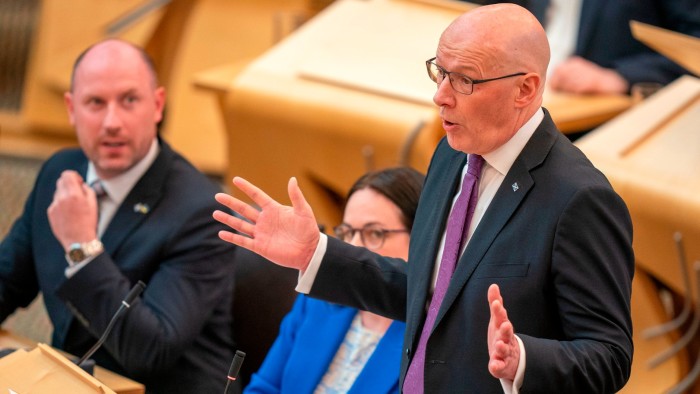Unlock the Editor’s Digest for free
Roula Khalaf, Editor of the FT, selects her favourite stories in this weekly newsletter.
John Swinney on Tuesday pledged extra healthcare appointments and an end to peak rail fares, as Scotland’s first minister doubled down on his focus on bread-and-butter issues with a year to go until parliamentary elections.
The measures came as Swinney set out the devolved government’s legislative programme four months early, in order to allow for a “full year” of delivery on the economy and the NHS ahead of Holyrood elections in May 2026.
After taking a hammering in the 2024 UK general election, the ruling Scottish National party is now leading its opponents north of the border in the polls after Labour’s troubled start to governing at Westminster.
Swinney lauded progress in the NHS since he became head of the Scottish government about a year ago but cautioned “there is more, much more to do”, as he promised 100,000 extra GP appointments and 150,000 more operations and procedures in the 2025-26 financial year.
“Getting our NHS on track is about reform that is fundamentally patient-centred. It is about investment, and it is about increasing productivity and capacity,” Swinney told MSPs.
Some 55 per cent of Scots said health “should be a main priority for the Scottish government”, according to YouGov polling in March, making it voters’ top issue of concern.
Swinney also promised to abolish peak rail fares on the nationalised Scottish rail system from the beginning of September, reinstating a policy that was piloted but later scrapped last year because of budget pressures.
The Scottish Greens — which were in a power-sharing agreement with the SNP between 2021 and 2024 — welcomed the U-turn on rail fares and called for “more brave decisions . . . to make all public transport cheaper”.
But Anas Sarwar, Scottish Labour leader, criticised the SNP’s Programme for Government for “borrowing” policies put forward by his party.
“After nearly two decades in power, if the SNP had any ideas they would have delivered them by now. The party and the man who created the mess can’t be the ones to fix it,” Sarwar said, in a reference to Swinney’s past roles as deputy first minister and finance secretary.
Pointing to emerging “new threats . . . that have the potential to cause extensive damage to the Scottish economy”, Swinney unveiled an export plan for Scottish businesses to help mitigate the impact of Donald Trump’s tariffs.
Companies will be able to apply for grants from an international growth support programme in order to assist expansion efforts.
To boost inward investment, a new portal showcasing commercial opportunities will be launched to provide investors with a “single entry point” to government.
Swinney pledged no further divergence from London on income tax. Most Scottish taxpayers pay less in income tax than the rest of the UK, but higher earners pay more.
He also pledged to boost planning capacity and reduce barriers — a common complaint from business — by launching “rapid audits” of planning teams in agencies in order to speed up project approvals.




